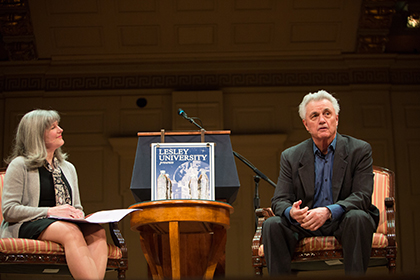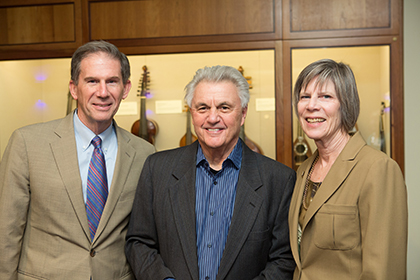When novelist John Irving writes a book, he writes the concluding sentence first.

Connie Ruzich interviews John Irving on the Symphony Hall stage.
And before he ever puts pen to paper, he mulls over his novels in his mind for years, “in some cases 20 years,” and writes his first drafts entirely by hand.
“I have nothing against my laptop, but it’s too fast, too easy,” said Irving. “Writing by hand is more like drawing. It seems to be the right pace for me. Given the fact that I know everything in the story before I write it, all I want to be thinking about is the language, the tone of voice, the pace of the language.”
Irving is one of the most popular and respected modern writers of fiction, known for his range of colorful, distinctive characters, engaging style and imaginative plots. He gave glimpses into his creative process, his literary heroes and personal vexations, during the Lesley University Boston Speakers Series on Wednesday night in Symphony Hall, as he answered questions about his famed novels.
“I work backward from an ending to where I know the story should begin. It’s not a fast process. It’s slow,” said Irving, who has been nominated for a National Book Award three times—winning once, in 1980, for his novel “The World According to Garp.” In 2000, he won an Oscar for Best Adapted Screenplay for “The Cider House Rules,” and in 2013, he won a Lambda Literary Award for his novel “In One Person.”
“Letting it grow and letting it develop is important to me,” Irving said of his stories. While his novels portray the full range of human experience and emotion, he aims to make readers wince at the “worst-case scenarios” woven throughout his oeuvre – the parts of the plotlines he “didn’t want to write” and “didn’t want to think about.”
“The part that made me a little sick when I thought about it, it’s not a novel without it,” said Irving. “I won’t write until I know the thing that turns my stomach. If there’s not that element in the novel, then why bother?”
Departing from the Speakers Series’ usual lecture format, Irving was interviewed onstage by Connie Ruzich, an English professor at Robert Morris University in Pennsylvania. Following their conversation, Irving participated in a Q&A session for which audience members submitted written questions that were asked by WGBH’s Phil Redo, Lesley’s media partner for the series.
Irving’s answers to Dr. Ruzich branched well beyond her questions, leading to anecdotes and some unrelated yet fascinating pronouncements. When Ruzich asked about his interests and why he quoted a line by author Jeanette Winterson in his most recent novel, which reads, “Religion is somewhere between fear and sex,” Irving first explained that what’s often referred to as an author’s recurring “themes” or “interests” are in fact a writer’s fears and obsessions.

Lesley University President Joseph Moore and his wife, Beth Chiquoine,
welcome John Irving (center).
“You have a lot of choices available to you when you write fiction – you make it up,” he cracked. “But you don’t have a choice about what you’re afraid of. You don’t have a choice about what your obsessions are, what wakes you up at four in the morning and keeps you up.”
Picking up the thread again later, he said, “Children, death of a child, fear of death of a child – that goes into the category of obsession. It’s certainly not an interest.”
Irving explained that his commonalities with Winterson’s work include anger, particularly around the mistreatment, marginalization and hatred of sexual minorities and sexual differences. “It’s clear that on issues of sexual intolerance, I am intolerant of intolerance.” At least half of his novels are political, he said, taking a side or a position.
“‘A Prayer for Owen Meany’ takes a position on Vietnam. ‘The Cider House Rules’ takes a position on abortion rights,” he asserted.
Ruzich asked if it’s hard to write the strong female characters in his books.
“No, and I don’t know why it would be or should be. I think many men spend a lot more time thinking about women than they do men,” Irving said as laughter erupted from the audience.
Captivating readers with worst-case scenarios
While Irving’s novels are noted for their expansive scope, vivid and engaging characterization, and moral and political criticism, he stressed the appalling and the tragic.
He counseled authors to imagine their readers as restless, hyperactive teenagers who would rather be doing something else, “and your job is to get their attention and keep it.”
“Make them sympathize with someone to whom you wouldn’t like something terrible to happen,” he said. “If you don’t like them, you won’t care what I do to them.”
Many of Irving’s 14 novels portray adolescent characters, “innocent but becoming less so,” and show how their experiences shape them as adults.
“How can you demonstrate how tragic something was if you don’t get to see that character 20 or 30 years later?” he posed. “Nothing can demonstrate the power of what happened to you until you see how it affected you as an adult.”
Ruzich asked why the title character knew his fate in “A Prayer for Owen Meany,” published in 1989.
“I always know before I begin a novel what the future for all my characters holds, and it’s tempting to (let) one of my characters in on what I know. … It’s not exactly a gift, particularly if you’re young,” he said. “Owen Meany is almost right about the future he sees. He’s not going to die in Vietnam, but he is going to die because of it.”
Irving lamented stylistic fetishes like the excessive use of italics, and poked fun at critics whose reviews reveal that they did not finish a novel and therefore arrived at wrong summaries and conclusions.
He referenced plotlines from a variety of his works, including “Avenue of Mysteries,” his most recent novel, in which the protagonist sleeps with a mother and a daughter.
“You do know that things written in novels are often not advice?” he said as the audience laughed. And for Irving’s characters’ choices and actions, “more often than not, they are worst-case scenarios.”
His worst-case scenarios have inspired many readers to write him and offer their personal tragedies and “appalling stories.” He dutifully replies via postcard and extends his sympathies, but what he really wants to say is, “Oh, I could make that worse,” he quipped. “You only got to the second husband. I could think of the third.”
Born and raised in Exeter, N.H., Irving noted that many of his novels are influenced by his New England roots and his experiences at prep school. He competed as a wrestler for 20 years, and coached wrestling until he was 47. But his fiction is not limited to his own experience – “I have not had a very interesting life,” he explained – and he believes writers should imagine beyond their own lives.
“ ‘Based on a true story’ is not a marketing tool for me. It means it’s probably not as good as a good writer could have imagined,” said Irving. “That’s a very small mirror through which to see the world or other people in it.”
To this day, he reveres the 19th century writers who inspired him as a teenager, including Charles Dickens, Herman Melville, Thomas Hardy and Nathaniel Hawthorne. He quoted Melville, whose advice to writers included, “Woe to him who seeks to please rather than to appall.”
“I do appall better than I do please,” said Irving. “I always have. I seek to.”
2016-17 Lesley University Boston Speakers Series
Irving‘s was the penultimate lecture in the 2015-16 series, and the evening kicked off with excitement and applause when moderator Phil Redo revealed the lineup for the sixth season. U.S. Supreme Court Justice Stephen Breyer will open the series on Sept. 28, 2016, followed by former Prime Minister of Israel Ehud Barak, award-winning actress Rita Moreno, Monty Python co-founder John Cleese, former chairman of the Joint Chiefs of Staff Gen. Martin Dempsey and journalist Ted Koppel. The season will conclude on April 26, 2017 with a panel discussion on racism in America with former NPR host Michelle Norris, Wall Street Journal columnist Jason Riley and co-founder of the Southern Poverty Law Center Morris Dees.